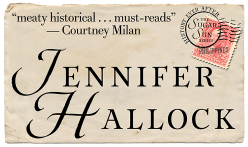Last week, I told you a bit about the craft workshops and panels I attended at #RT17. This week, I’m all business. This is long, so you might want to digest it in chunks.

This workshop was led by Smashwords founder Mark Coker. You can read a comprehensive recap of all ten trends at author Cecilia Tan’s blog here, and most of it you already know: digital publishing has democratized publishing; romance has led the way in professional-quality independent publishing; and that there is a glut of high quality, low-priced books. The ability to inventory digital books for basically free means that everything stays in print and on the market forever. This increased supply has pushed down prices, especially for new authors.
Coker ended the presentation with a call for author mobilization against KDP Select, Amazon’s exclusivity program with subscription-based pricing. He portrayed KDP’s system as predatory pricing, a monopolistic practice that threatens to put Amazon’s competitors out of business. This threatens the newly-found independence and choice of independent authors. We have just been released from bondage to the Big Five, and now we’re in bondage to Amazon, according to Coker. While this may be true, he did not fully recognize the prisoner’s dilemma that Amazon presents to authors. If we all stood up together as one and refused to participate in KDP, we would all be punished equally by Amazon’s algorithm—meaning none of us would be punished. This might put KDP out of business. But without collective action, pulling out of KDP will only hurt the individual author who takes the stand. Your books will be buried in Amazon, and other authors will be thrilled to take your spot at the top of the bestseller lists. In this prisoner’s dilemma, no one chooses the collective good over their own self-interest. That’s human nature, and Amazon knows it.

This presentation was less ideological and more data-driven than the first. Some of the data followed the trends seen in his 2016 survey, but let me recap what I found particularly interesting. Note that all of this is based on averages, so your mileage may vary. The survey showed that among his authors:
- Write as long as you need to. The top 70 bestselling romance authors at Smashwords average 92,000 words (excluding box sets) and 113,000 words (including box sets).
- But keep the titles short. The top 100 bestsellers at Smashwords have 24.45 characters on average in the title, while the 900-1000 bestsellers have 30.11 characters on average. The last 100 surveyed (bestsellers 9,900-10,000) average 35.5 characters.
- How much should you charge for your ebooks? Free books still get the most downloads, but among books for sale, the best range is still from $2.99-$4.99. The spot at $1.99 is a dead zone. It seems to be better for Smashwords authors to price at $0.99 or $2.99 than $1.99.
- If you write a series—and, yes, they still dominate the romance market—you should give away the starter for free. 7 out of 10 of the bestselling series on Smashwords have a free starter. Interestingly, 4 of the 10 did not have any new book in the series published within the survey period (a year), which shows the persistence of series, even when complete or on pause.
- Should you put your books up for preorder? Especially in the iBooks store, yes. They count your preorders as first day sales, unlike Amazon where they are counted on the day the purchase is made. Coker found that of the top 1000 bestselling authors, 61.7% released at least one book on preorder. There could be other factors at work, like the fact that the most professional and organized authors might be the one getting their act together for preorders. Maybe they have nicer covers, better writing, and better advance marketing, he suggested.
- Should you do a box set? “Box sets are not the path to riches, but they can be a nice complement to your publishing strategy,” Coker said. Authors participating in at least one box set—whether alone or with other authors—are highly represented among bestselling authors. However, in my opinion, this may be more a function of catalog size than actual box set sales. Authors with more books in the backlist tend to have higher earnings and more followers, and these are the authors who have the material to create a box set. Moreover, the best selling box sets are $0.99, which is a pretty low value on that many words.

This workshop featured two executives of Written Word Media, the team behind FreeBooksy and Bargain Booksy. It was a little free-form, but here are the takeaways that I think may interest fellow authors:
- Perceived value was a very interesting concept to me. Giving a book away for free without any hurdles not only loses you revenue, but it also lowers the “perceived value” of your book. But if you take an email address from a reader in order to get the book, that adds perceived value. Perceived value can also come from a reader pay to attend an event. Another trick is to keep the price on the back of the book the same as others in industry, and then put “special price” stickers on it. This way you can give special sales at specific events while still keeping the perceived value of your book high.
- Covers are important, but they do not make the sale. They need to accurately represent the genre, general theme, and relative professionalism of the book—but NOT the whole plot! The point of a good cover is to get someone to read the blurb. The blurb sells the book.
- In terms of ebook sales, the panel sees people making the most at the $2.99-$4.99 range, which agrees with Coker’s findings. (And, by the way, Coker joined the panel informally.) Bargain Booksy thinks that middle-range prices ($4.99) with flash sales (“for a limited time only”) is a good strategy.
- Not surprisingly, it is easier to bring prices down than up. If you need to increase prices, do so incrementally.
- As you might expect, pricing will expand and contract based on the number of books being released. This is supply and demand. The last two years have seen a lot of people fall out of the market, which is why we see prices going up a bit.


To be honest, this workshop turned into an infomercial of why we authors needed a traditional publisher, especially Sourcebooks. Even though I am fond of Sourcebooks because they published a few of Laura Kinsale’s books, I was still annoyed by their attitude. Nevertheless, there were a few interesting bits of data:
- There are impulse buyers out there! In a Neilsen study of romance book buyers, 23% planned to buy one specific book at specific time; 23% planned to buy the one specific book, but not at a specific time; 26% planned to buy a book at a specific time, but not any particular book; and 30% didn’t plan to buy anything at all, making it a total impulse purchase.
- How do readers first find you? Browsing the store accounts for 15% of first discovery. Reader recommendations account for 15%, but it needs to be recommended three times. Your author marketing accounts for 14%, but people need to see your materials at least twice. Finally, print and other analog (non-internet based) publicity counts for 13%, but it needs reinforcement 2.5 times. Bottom line: your marketing has an impact, but it’s best when reinforced by another source.
- What do readers want to hear in your marketing? 31% of book purchases are based on book message. How do they like the sound of your story? 26% buy because they like your other books or the rest of your series. 15% is based upon reader recommendations. Only 8% of purchasing decisions are based upon special pricing alone, so don’t just drop your prices without a plan. Make sure you have a good book message, too!
- Sourcebooks’ data also suggests that “freegans” will not convert to “paygans.” Just because people download your book for free doesn’t mean they will purchase more. This seems to contradict Coker’s data. (See above.)

Much of what I learned in this workshop is hard to describe because it was based on the attendees pitching to ReShonda. She was brutally honest in her advice, but it was totally warranted. ReShonda was definitely the best teacher at the conference. I’m a little bit in love with her. Here are a few of her points:
- Twitter has become a requirement in many newsrooms today. Follow your local reporters and know what they cover. This helps you find the right person for your story.
- When you call or contact a newspaper or television station, there is no “my book this” or “my book that.” Have your assistant call the newsroom, even if your “assistant” is you (under a different name). First talk about a critical issue the reporter should be aware of, and then reveal that a local expert (ahem, that’s you) wrote a book about this very problem. Give your pitch as a story, not a summary.
- Email a pitch for a weekend feature first thing Thursday morning. If you try to do it late Wednesday, it will get buried in the pitches that come after you. And if you wait too long, they will be working on other things before yours. And why Thursday? Because it gives them time to consider your book for their weekend story planning, when it is hard to find news.
- The email subject is your hook. Never say “new book” in your hook.
- Paid news service promo agency stuff gets ignored. Do it yourself instead. Write a text email and attach a press release, if you have one. Do not bother sending books or promo kits. They will be thrown away.
- Follow up. Don’t be a stalker, of course, but follow up two to three times by email. Call once if you need to.
You’ve reached the end! If you’re still here, I’m impressed. I learned a lot about the industry at #RT17. Not enough to justify the price tag, of course. In fact, that was maybe the most important business lesson: national conferences do not make financial sense if you have to pay your own way. I didn’t go to make money, though. I went to have fun, and I did. But I hope you’ve been more frugal and gotten your #RT17 value from this post. Next year, you can do the same for me.

